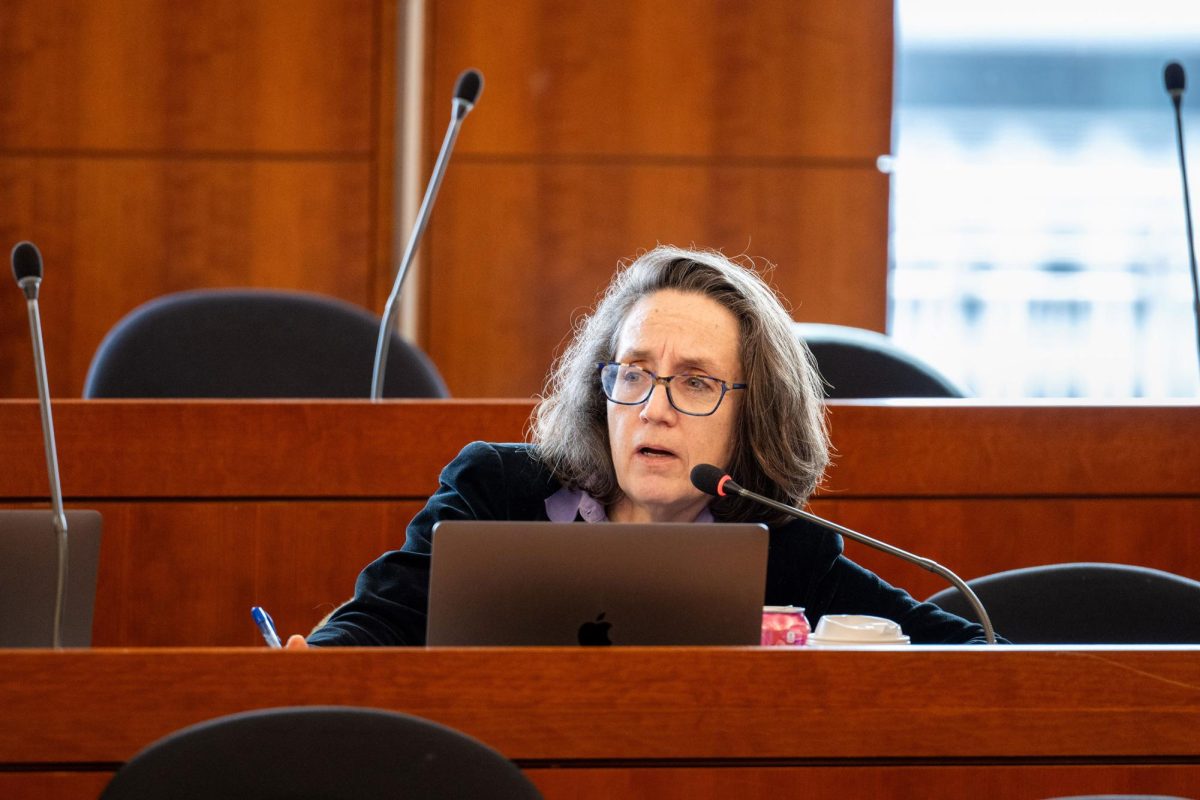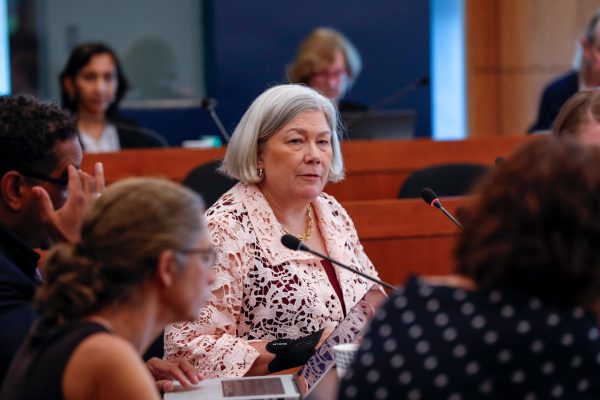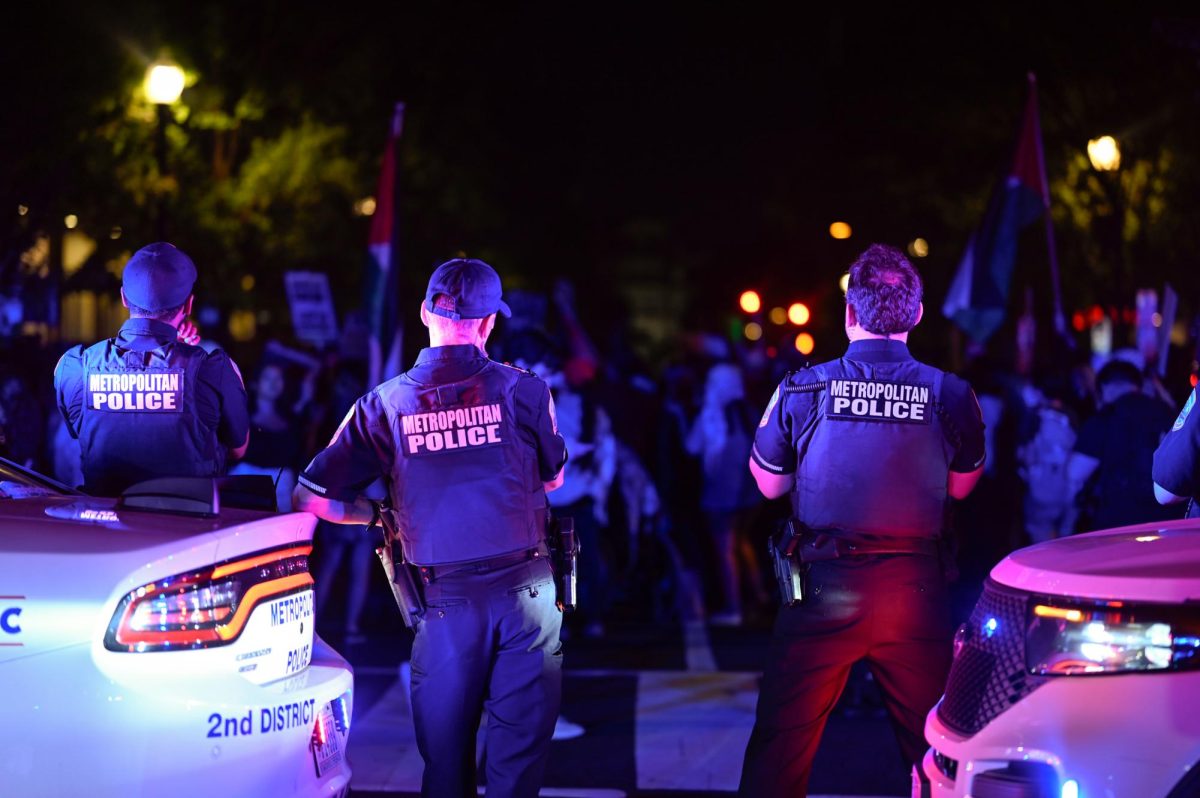Faculty senators unanimously passed a resolution Friday that reaffirms academic freedom, a response to GW’s plan to clarify free speech policies and resolve on-campus tensions after the outbreak of the war in Gaza.
The resolution asks officials to involve community members when creating and communicating academic freedom policies, protect “liberal educational values” and alert faculty to demonstrations that may disrupt their classes. Faculty senators said they were not consulted before Provost Chris Bracey and University President Ellen Granberg unveiled a plan in January to clarify free speech policies and cultivate “productive” conversations, despite faculty repeatedly asking officials at senate meetings to consult them in the University-wide initiative.
“In this volatile climate when clarity around rules and guidelines governing speech are essential, the University has been notably slow to articulate its free speech provisions, despite the fact there has been particular urgency around the issue since October of 2023 and despite repeated questions on the matter from the senate,” said Katrin Schultheiss, a faculty senator who advocated for the resolution on the floor.
The University’s plan includes programming to reduce campus tensions through panels, support students affected by the war or victims of doxxing, and clarify free speech policies that conflict with others. Granberg said at the meeting that the plan was spearheaded by a “leadership working group,” that will continue to evaluate campus-wide measures. Schultheiss said the senate is unaware of any faculty members who serve on the free speech working group.
The measure also requests officials include the Educational Policies and Technology Committee and the Professional Ethics and Academic Freedom Committee in updating policies that affect academic freedoms and free speech since faculty senators said the appropriate committees were not consulted on the University’s plan. Schultheiss said the measure was “particularly pressing” due to officials’ disciplinary proceedings in response to student-led demonstrations on campus.
“This resolution is offered in the interest of spurring meaningful conversation between faculty and administrators on the critical issue of academic freedom and freedom of expression throughout the University community,” Schultheiss said.
Granberg said community members can submit feedback on the plan to the leadership group through an online form.
University spokesperson Julia Metjian said officials have leaned on faculty for events connected with the plan like the School of Media & Public Affairs’ Sesno Series.
“The policy work underway seeks to clarify existing policies and ensure common understanding of how they are implemented and enforced,” she said in an email. “We are collaborating on this with the Professional Ethics and Academic Freedom Committee, and any substantive policy changes would go through a formal Faculty Senate process.”
As it stands, the University’s academic freedom guidelines state it is not GW’s role to “shield” individuals from views they find unwelcome, disagreeable or deeply offensive and that mutual respect does not justify stifling expression protected by academic freedom and freedom of speech. Those guidelines were developed and reaffirmed by the senate in 2017 and 2018, respectively.
Faculty Senate Executive Committee Chair Ilana Feldman said faculty’s academic freedoms and student’s ability to exercise free expression are closely tied together.
“These things are not simply parallels as part of a broad landscape, but actually impact each other and faculty feel the constraints on other people’s other constituency students expression is a constraint on their own expression,” Feldman said.
Some pro-Palestinian students have accused school officials of silencing their views on campus, citing incidents like the suspension of Students for Justice in Palestine at GW in November, followed by reported disciplinary proceedings in February against student organizations that participated in events hosted by the Student Coalition for Palestine at GWU.
The Friday measure is also an official response to bubbling concerns among the faculty senators over academic freedom and free speech policies at GW, an issue they’ve repeatedly brought to officials at senate meetings since the war in Gaza began.
During a November senate meeting, faculty senators said Granberg has the appropriate committees at her “disposal” when making decisions centered on academic freedoms.
“I just encourage that as part of a shared governance emphasis that we’re here as a resource and many of us have direct insight into some of these complex discussions,” Sarah Wagner, a faculty senator and co-chair of the Educational Policies and Technology Committee, said at the November meeting.
In the senate’s February meeting — after the plan was released, reportedly without the consultation of faculty — senators expressed concerns over who would review academic freedoms and free speech policies and what they would do to clarify those policies going forward. At the time, Bracey said GW’s Office of the General Counsel and Dean of Students Colette Coleman were leading the review.
Bracey and Granberg said at the February meeting that faculty would be included in decisions relating to the academic freedoms policy.
“Obviously, we would want to bring in the appropriate Faculty Senate committee, whether it’s [education] policy or some other committee, to take a look at that in connection with the administrative team to ensure that what we’re doing makes sense for the entire University community,” Bracey said at the meeting.
Some senators also previously expressed worry to administrators about faculty being left out of the development of the plan as a whole because it could impact academic freedoms.
“Here we seem to have a plan which has been formulated largely by the administration, although I gather there has been some input by other people,” Phil Wirtz, a faculty senator, said at the senate’s February meeting. “I don’t know the extent to which the faculty has been involved — I certainly know the extent to which I have been involved, in that I haven’t heard anything about it.”






